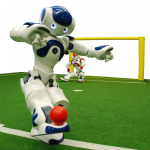Schräge Roboter2014 - 2015
Schräge Roboter ist ein Wissenschaftskommunikationsprojekt der Gruppe Vision for Robotics, gefördert vom FWF Wissenschaftsfonds. Das Ziel des Projektes ist es Schülerinnen und Schülern Robotik aus der Produktentwicklungsperspektive näherzubringen und dabei alle SchülerInnen anzusprechen (nicht nur jene, die bereits an Mathematik, Informatik, Naturwissenschaften und Technik - MINT - Fächern interessiert sind). Weiterlesen →
SQUIRREL2014 - 2018
Clutter in an open world is a challenge for many aspects of robotic systems, especially for autonomous robots deployed in unstructured domestic settings, affecting navigation, manipulation, vision, human robot interaction and planning. Squirrel addresses these issues by actively controlling clutter and incrementally learning to extend the robot’s capabilities while doing so. Weiterlesen →
Argonauts2014 - 2016
Total has launched in December 2013, the ARGOS Challenge (Autonomous Robot for Gas and Oil Sites), an international robotics competition designed to foster the development of a new generation of autonomous robots adapted to the oil and gas sites. These robots will be capable of performing inspection tasks, detecting anomalies and intervening in emergency situations. Weiterlesen →
FRANC2013 - 2015
Während in der modernen Landwirtschaft zunehmend leistungsfähige komplexe Maschinen mit hochentwickelter Technologie eingesetzt werden, ist der Biolandbau vielfach von manuellen Arbeiten geprägt. Im Projekt FRANC wird ein autonomes Fahrzeug entwickelt und gebaut, welches speziell im Biolandbau eingesetzt werden kann. Weiterlesen →

STRANDS2013 - 2017
STRANDS aims to enable a robot to achieve robust and intelligent behaviour in human environments through adaptation to, and the exploitation of, long-term experience. Our approach is based on understanding 3D space and how it changes over time, from milliseconds to months. Weiterlesen →
V4HRC2013 - 2016
The aim is to explore how human dyads cooperate in vision-based tasks and how they achieve grounding. The findings from human dyad will then be transferred in an adapted manner to human-robot interaction in order to inform the behavior implementation of the robot. Weiterlesen →
HOBBIT2011 - 2015
While world players in home care robotics tend to follow a pragmatic approach such as single function systems (USA) or humanoid robots (Japan, Korea), we introduce a new, more user-centred concept called “Mutual Care”: By providing a possibility for the Human to “take care” of the robot like a partner, real feelings and affections toward it will be created. Weiterlesen →
Meta Mechanics2008 - 2009
The metamechanics RoboCup@Home team was established in late 2008 at the Vienna University of Technology. It is a mixed team of the Faculty of Electrical Engineering and Information Technology and the Department of Computer Science. Weiterlesen →

GRASP2008 - 2010
The aim of GRASP is the design of a cognitive system capable of performing tasks in open-ended environments, dealing with uncertainty and novel situations. The design of such a system must take into account three important facts: i) it has to be based on solid theoretical basis, and ii) it has to be extensively evaluated on suitable and measurable basis, thus iii) allowing for self-understanding and self-extension. Weiterlesen →

Austrian Kangaroos2008 - 2009
Roboterfussball hat einen hohen Unterhaltungswert, ist aber in Wirklichkeit eine ernsthafte Testumgebung für Forschung und Entwicklung in allen Bereichen. Die standardisierten humanoiden Roboter bieten eine ideale Entwicklungsplattform, die an zahlreichen internationalen Universitäten genutzt wird. So wird neben neuartigen Geh-Algorithmen und Künstlicher Intelligenz auch intensiv an verbesserter Computerbildverarbeitung und im Bereich echtzeitfähiger hochparalleler Softwarearchitekturen für Embedded Systems geforscht. Weiterlesen →